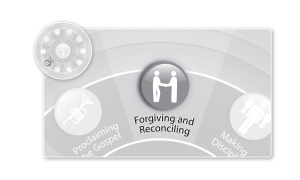 God sets us believers free from the power of sin but not from the sin-stained story of our redemption. We’re not set free from that story because God wants us and others to see Christ Jesus continually displaying his gloriously unlimited patience toward us in real time, in actual human history.
God sets us believers free from the power of sin but not from the sin-stained story of our redemption. We’re not set free from that story because God wants us and others to see Christ Jesus continually displaying his gloriously unlimited patience toward us in real time, in actual human history.
Our sin-stained history, when it is ever before us and others, ensures humility. When we have amnesia about our misdeeds, it makes for bad theology and no sanctification and it leads to a hypocritical contempt of our fellow sin-strugglers.
As Pastor Brian Tubbs says, “Flawed, sinful human beings do not have the moral right to hold grudges or bitterness toward others.”
What he’s saying is that we’re often bitter toward those who sin against us because we judge them outside of the context of our own sin-stained story of redemption. Reinhold Niebuhr, the Christian ethicist, says, “There is no deeper pathos in the spiritual life than the cruelty of righteous people.… Their pride is the basis of their lack of mercy.”
Robust memory of our sins is the antidote to pride.
So when it comes to rendering a verdict on our guilt, God does not remember our sin.
But when it comes to telling and bringing to completion the story of our redemption, God remembers every detail of our sin, transforms it through his grace, and enters the whole story into the public record. Christian marriage and family therapist Larry Barber puts it like this:
God does not forgive us by forgetting our sin. In fact, the Old Testament is a record of the history of God’s dealings with the nation of Israel, and a significant portion of that history involved the sin of the nation and its rebellion against God. Certainly one of the reasons God inspired the biblical authors to record the history of Israel was so that later generations would remember what had happened in the past.
The Bible tells us that God is the sovereign, transcendent creator of all that exists. Nothing happens to us that He has not ordained. But He does not author the events and experiences of our lives and then forget that they ever happened. God’s purpose is that we learn from the experiences that He has willed.
So God remembers sin forever, but only for our sake, and for the sake of those crushed by our sin. His mercy takes away not only the sting of death (like Paul says in 1 Corinthians 15:55, “Death, where is thy sting?”), but it also takes away the sting of a history that is not saturated in his grace—a history stuck in sin.
When our sinful history is saturated in his grace, it makes it possible for us to bear our sin-stained past and present, because it turns that sin-stained past and present into a field of future hope.
So forgiveness demands memory. And it demands God’s ongoing judgment as well—not merely a sinner’s one-time passage through a terrifying turnstile of judgment, but a redeemed believer’s lifestyle of accepting God’s ongoing retelling of our stories, the parts that make us look good and the parts that reveal us to be really quite bad after all.
God insists that we, his redeemed ones, remember our past quite openly and publicly, with full admission of and contrition for sins past and present. But part of what he calls us to do is to remember our sins without condemnation of ourselves or anyone else. That’s how his glory shows through. That’s how people come to realize how merciful he really is. And God calls us to tell our stories as “in process”—that is, with full faith that God is redeeming us.
In his mercy, God does not cut the cord between us and his judgment at the moment he forgives us. Instead, he cinches the cord permanently. God’s ongoing judgment of us is the anchor that prevents us from falling back into the waves of pride, amnesia, and condemnation which we had fallen into and from which he is saving us. It is only when we are permanently secured by the ongoing judgment of God that sin can be addressed by anyone—God, the offender, and the offended—with something other than pain and regret and anger.
And that–as we’ll talk about in Part IV of our series–gives us a whole different way to react to the sin of others.











Thank you Eric!